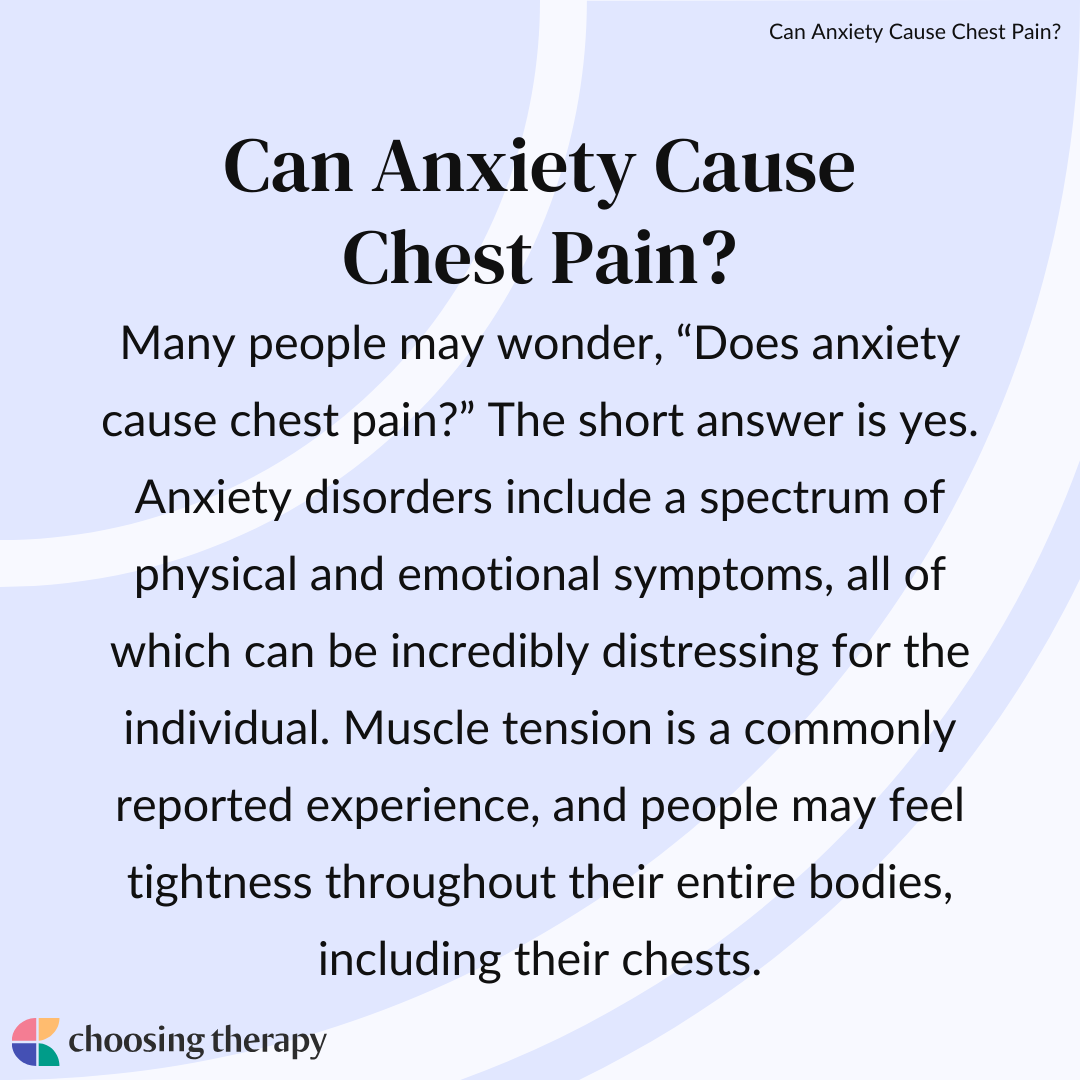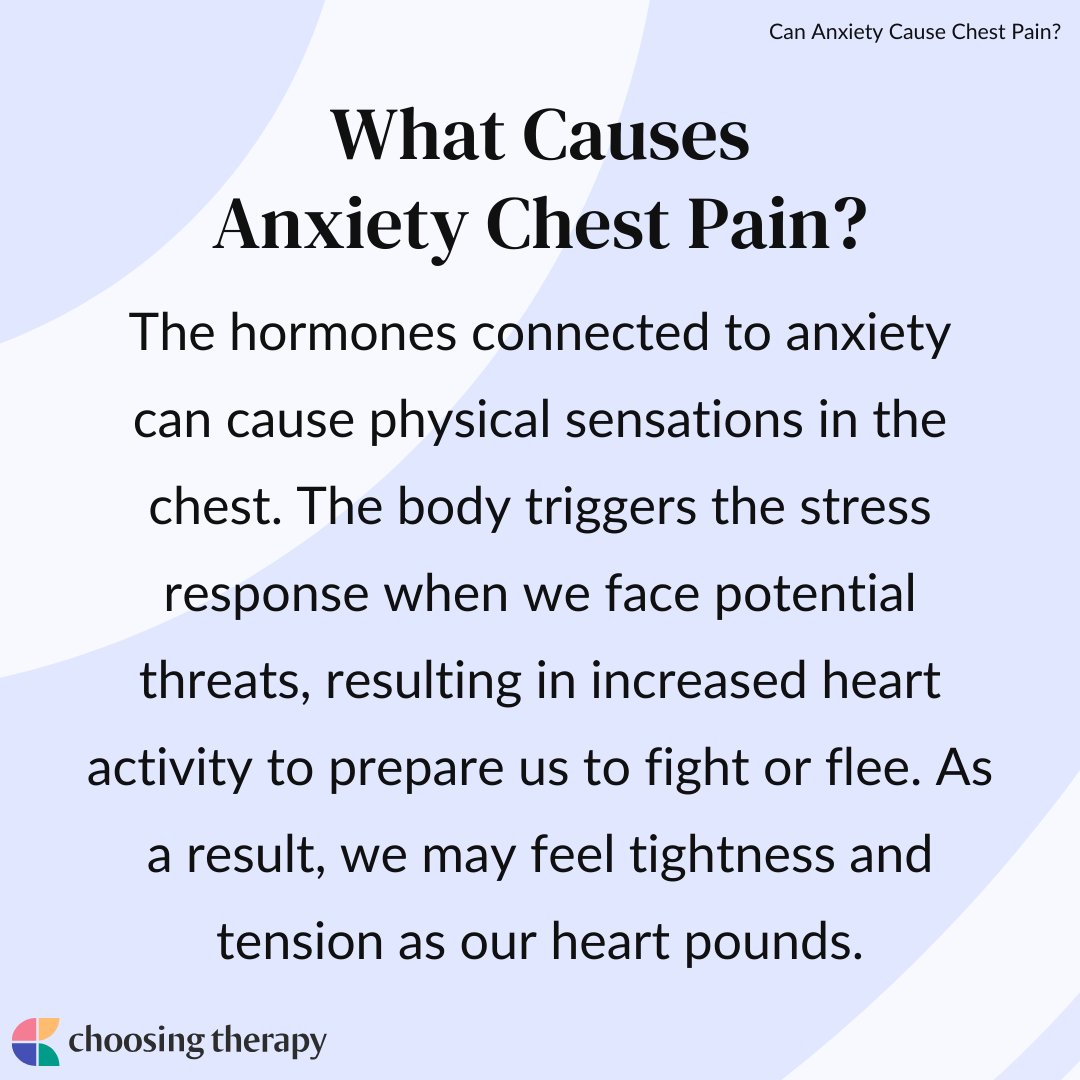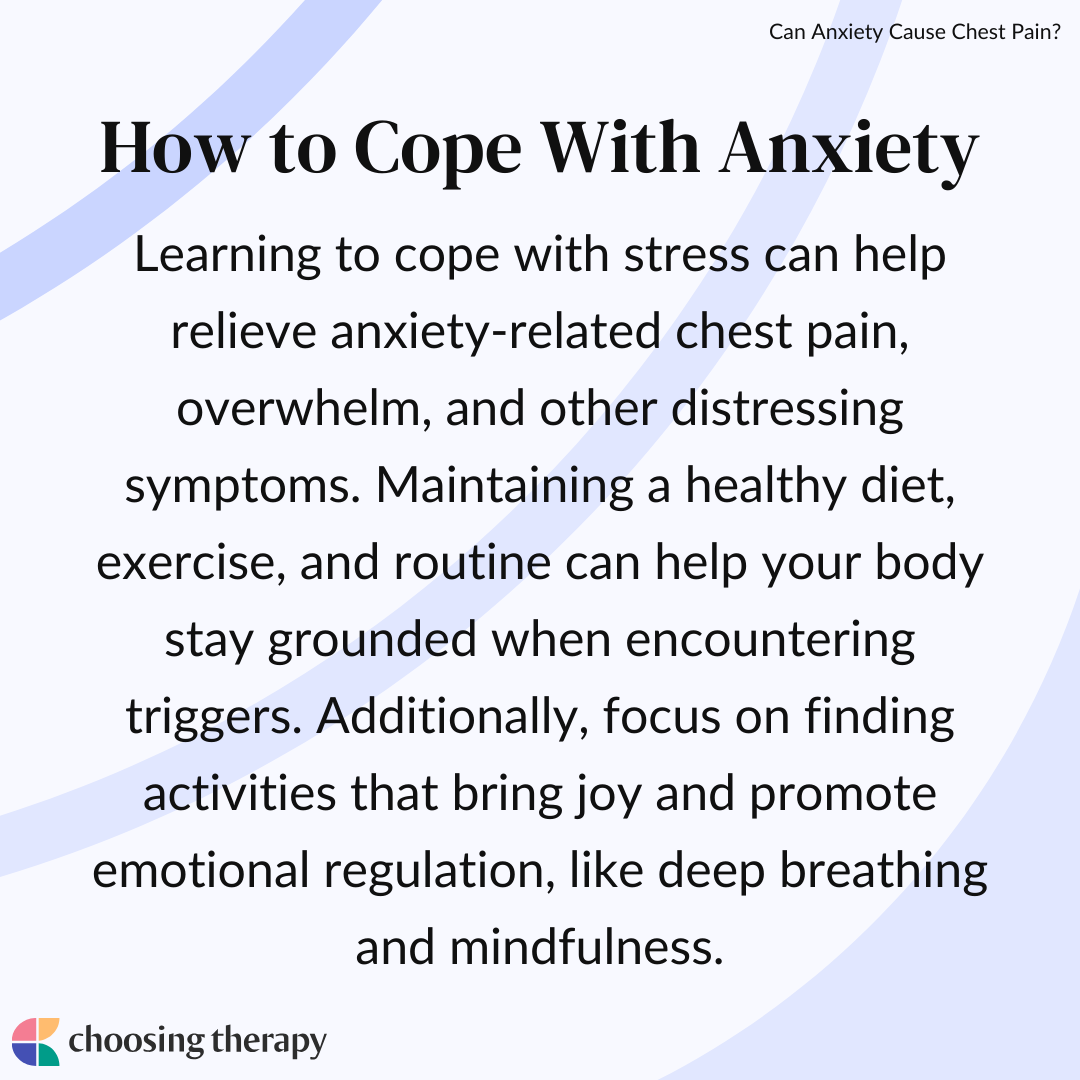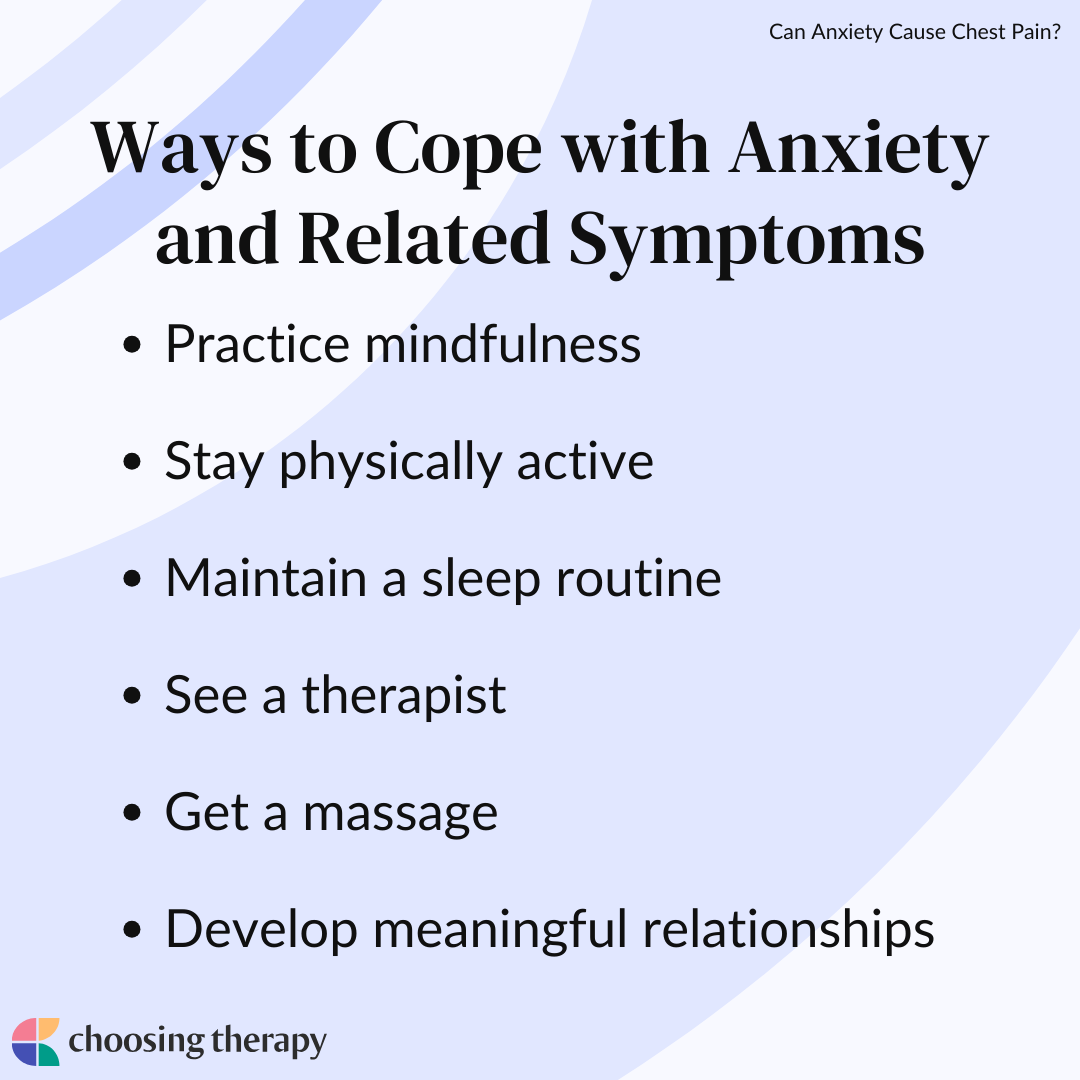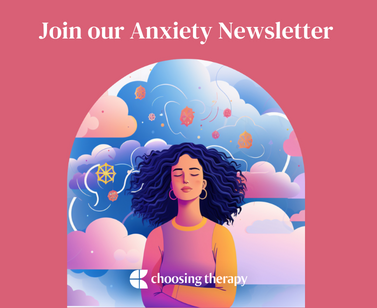Anxiety can cause chest pain, as the brain releases cortisol and adrenaline when individuals feel emotionally flooded.1 These chemicals prepare the body for “fight or flight,” resulting in rapid heartbeat, elevated blood pressure, and muscle tension. Experiencing these changes can contribute to atypical tightness and pain in the chest.
Would you like to have less anxiety? Anxiety is treatable with therapy. BetterHelp has over 20,000 licensed therapists who provide convenient and affordable online therapy. BetterHelp starts at $65 per week. Take a Free Online Assessment and get matched with the right therapist for you.
Can Anxiety Cause Chest Pain?
Many people may wonder, “Does anxiety cause chest pain?” The short answer is yes. Anxiety disorders include a spectrum of physical and emotional symptoms, all of which can be incredibly distressing for the individual. Muscle tension is a commonly reported experience, and people may feel tightness throughout their entire bodies, including their chests.
What Does Chest Pain From Anxiety Feel Like?
Chest pain from anxiety can feel like shooting pain, a dull, persistent ache, or spasms. Everyone experiences anxiety differently, meaning the onset of symptoms can vary. Some individuals may have sudden chest pain, while others report a gradual increase in tension.
Anxiety in the chest may feel like:
- Sharp or shooting pain
- Stabbing pressure
- Chest tightness or tension
- Persistent chest aching
- Muscle spasms in the chest
- Numbness or burning
- Lack of breath or difficulty breathing
How Long Does Anxiety Chest Pain Last?
Anxiety-related chest pain often resolves after a few minutes. However, some individuals experience a chronic dull ache for hours. Determining exactly how long an episode lasts is impossible, as everyone has a unique experience with anxiety. In most cases, relaxation techniques like deep breathing can help reduce tension.
Anxiety Chest Pain Vs. Heart Attack Chest Pain
Anxiety and chest pain can be uncomfortable, but individuals should recognize when symptoms may indicate an underlying health problem. Be safe by seeking medical attention, as early intervention may help prevent a heart attack.
Symptoms of anxiety-related chest pain may include:
- Sharp/shooting pain
- Slow improvement over time
- Chest pain accompanied by sweatiness, trembling, loss of breath, or dizziness2
- Pain can get better with distraction, forced breathing, or activity
Symptoms of heart attack chest pain may include:
- Chest pain that travels down the arms or up to the jaw
- Pain increases with activity and exertion
- Feeling heaviness in the chest
- Squeezing sensation in the chest
- Rapid heart rate and shortness of breath that does not change
- Sweating
- Dizziness
What Causes Anxiety Chest Pain?
The hormones connected to anxiety can cause physical sensations in the chest.3 The body triggers the stress response when we face potential threats, resulting in increased heart activity to prepare us to fight or flee. As a result, we may feel tightness and tension as our heart pounds.
While this response generally subsides, experiencing constant, chronic, or toxic stress can leave the body stuck in fight or flight mode. Over time, this prolonged exposure can worsen symptoms of anxiety and prolong chest pain. For this reason, seeking professional support and using coping skills are essential.
Other Physical Symptoms of Anxiety
As explained, anxiety can result in many physical symptoms aside from chest pain, including nausea, ringing in the ears, blurry vision, and stomach upset. Internal triggers could be troubling emotions, memories, or worries. Environmental factors can also contribute to anxiety, such as social interactions or unexpected events.
Common physical symptoms of anxiety include:
- Sweaty palms
- Difficulty concentrating
- Pressured speech
- Chest pain
- Muscle tension
- Grinding teeth
- Ringing in the ears (tinnitus)
- Nausea
- Headaches
- Distractibility
How to Cope With Anxiety
Learning to cope with stress can help relieve anxiety-related chest pain, overwhelm, and other distressing symptoms. For example, maintaining a healthy diet, exercise, and routine can help your body stay grounded when encountering triggers.4 Additionally, focus on finding activities that bring joy and promote emotional regulation, like deep breathing and mindfulness.
Options For Anxiety Treatment Talk Therapy – Get help from a licensed therapist. Betterhelp offers online therapy starting at $65 per week. Free Assessment Psychiatry for Anxiety – Looking for anxiety treatment that prioritizes you? Talkiatry can help. Find an in-network psychiatrist you can see online. Get started with our short assessment. Visit Talkiatry
Below are ways to cope with anxiety and related symptoms:
- Practice mindfulness: Mindfulness and meditation for anxiety can help you remain grounded, reduce stress, and potentially prevent chest pain caused by anxiety. These tools provide greater insight into your symptoms and how to address them.
- Stay physically active: Exercise can improve mental health for those seeking natural remedies for anxiety.4 Physical activity boosts “feel good” hormones, helping reduce stress. Consider adding movement into your daily routine, even for a few minutes.
- Maintain a sleep routine: Sleep and anxiety are deeply correlated. Adequate sleep is essential for mental and physical functioning, so practicing healthy sleep hygiene can help you feel your best. The more well-rested you are, the more emotional bandwidth you have to tackle challenges.
- See a therapist: Anxiety disorders are very responsive to psychotherapy treatment. A therapist can help you test negative thoughts and address issues that contribute to anxiety-induced chest pain, discomfort, and worry.
- Get a massage: The body responds to anxiety by tensing your muscles, but you can combat this reaction by getting a massage.
- Develop meaningful relationships: Relationships are one of life’s greatest gifts. Focus on building more connections with others to gain a different perspective on your problems. Your self-disclosure and the relational support received can calm your anxiety.
Can Treatment Prevent Anxiety Chest Pain?
Therapy and medication management can help address the primary causes of your anxiety, thus reducing the risk of experiencing chest pain. Anxiety treatments can assist you in developing mindfulness practices, gaining self-awareness, and adopting healthy habits that foster resiliency. You can find the right therapist in an online therapist directory or by consulting your physician.
Betterhelp – Affordable, convenient, online therapy – Get 20% Off Your First Month
Common treatment options for anxiety include:
- Somatic therapy: Somatic therapy focuses on how your body feels in response to stress. This approach helps you recognize how your anxiety starts, progresses, and ends in your body.
- Cognitive behavior therapy (CBT): CBT for anxiety examines how our internal beliefs and emotions contribute to subsequent actions. Replacing these unhealthy habits with positive alternatives can help reduce worry and overwhelm.
- Dialectical behavior therapy (DBT): DBT for anxiety teaches clients mindfulness, emotion regulation, and distress tolerance skills to cope with stress.
- Acceptance and commitment therapy (ACT): ACT for anxiety proposes that anxiety is a product of not living within your value system. Thus, reorientation to values, beliefs, and aspirations can reduce anxiety.
- Medication: Medication for anxiety is a powerful and efficient way to manage symptoms, including chest pain. Consult a licensed physician to review available options and potential adverse effects.
In My Experience
To help our readers take the next step in their mental health journey, Choosing Therapy has partnered with leaders in mental health and wellness. Choosing Therapy is compensated for marketing by the companies included below. Talk Therapy Online-Therapy.com – Get support and guidance from a licensed therapist. Online-Therapy.com provides 45 minutes weekly video sessions and unlimited text messaging with your therapist for only $64/week. Get Started Virtual Psychiatry Hims / Hers If you’re living with anxiety or depression, finding the right medication match may make all the difference. Connect with a licensed healthcare provider in just 12 – 48 hours. Explore FDA-approved treatment options and get free shipping, if prescribed. No insurance required. Get Started Anxiety Newsletter A free newsletter from Choosing Therapy for those impacted by anxiety. Get helpful tips and the latest information. Sign Up Learn Mindfulness, Meditation, & Relaxation Techniques Mindfulness.com – Change your life by practicing mindfulness. In a few minutes a day, you can start developing mindfulness and meditation skills. Free Trial Choosing Therapy Directory You can search for therapists by specialty, experience, insurance, or price, and location. Find a therapist today.Additional Resources
Online Anxiety Test A few questions from Talkiatry can help you understand your symptoms and give you a recommendation for what to do next. How Does ERP Help With Intrusive Thoughts? Obsessive compulsive disorder (OCD) is a psychiatric condition marked by the presence of obsessive thoughts, images, doubts, or urges, followed by compulsive behaviors or acts aimed at easing the distress caused by the obsession. While the content of the obsessions can take many forms, they are always repetitive, persistent, involuntary, and intrusive, and they often result in a great deal of anxiety for the person experiencing them.





